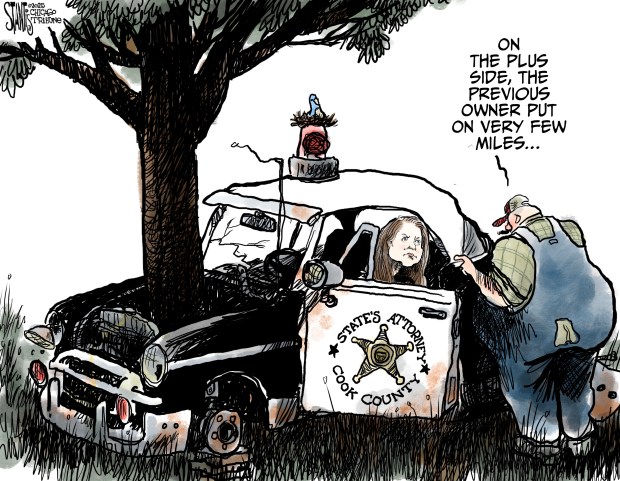Gov. J.B. Pritzker has labeled the border situation as “untenable.” He’s right.
About 37,000 asylum-seekers have arrived in Chicago by bus or airplane from Texas since Aug. 31, 2022. As of Wednesday, 10,845 migrants were still living in shelters.
Since 2022, Illinois and Chicago have allocated or committed hundreds of millions to support migrants seeking asylum. Adding to the financial burden, Mayor Brandon Johnson’s administration disclosed its plan to redirect an extra $95 million in COVID-19-relief funds toward migrant shelter costs.
Just recently, Pritzker and Cook County Board President Toni Preckwinkle pledged an additional $250 million in funding. Astonishingly, the vast majority of this spending has been initiated by executive authority, circumventing legislative approval, sidestepping debate and glaringly lacking transparency or accountability regarding expenditure management.
Let’s cut to the chase. The migrant crisis in Illinois is a problem of our own making. Chicago, designated a sanctuary city since 1985, further solidified its status in 2021 by prohibiting law enforcement from working with immigration officers. The governor’s 18th emergency disaster proclamation, issued on Jan. 5, tells us everything we need to know as to why Illinois and the city of Chicago have become a mecca for migrants. Supports include:
• Emergency shelter and housing.
• Food.
• Medical assessments and treatment.
• Case management services including legal services and job readiness support.
• Benefits for victims of trafficking, torture and other serious crimes.
• Enrollment in public schools.
• Longer-term housing and housing assistance.
The governor’s emergency proclamations, while proclaiming Illinois as a welcoming state and outlining support for migrants, essentially grant the governor unchecked spending authority without legislative oversight or review. Both city and state responses to the crisis pivot not on curbing the migrant influx but on securing federal bailouts, all while deflecting blame onto Texas Gov. Greg Abbott for the surge in migrant arrivals.
Pritzker’s emergency measures amount to the unilateral consolidation of legislative power in the executive branch. They suspend ordinary purchasing rules and grant-making protocols, encompassing the entire state as a disaster area and effectively usurping normal state operations under the appearance of crisis management.
The General Assembly’s failure to restrain the governor’s emergency powers is an abdication of its responsibility to act as a coequal branch of government. Despite having the authority to amend and restrict Pritzker’s emergency powers, the General Assembly’s inaction allows the governor to exercise unconstrained spending authority with little real oversight and accountability.
Meanwhile, Johnson’s office continues unilateral spending on migrant services. The City Council, lacking the necessary resources for oversight, remains sidelined, unable to scrutinize expenditures or monitor the city’s actions effectively.
Chicago, purportedly a progressive bastion, remains under the iron grip of mayoral authority, with the City Council failing to assert its oversight role. The mayor’s opaque decision-making process, exemplified by the handling of the migrant crisis, underscores a pattern of poor governance, characterized by fiscal irresponsibility and lack of transparency.
The revelation that the city failed to take advantage of the Catholic Archdiocese’s offer, since 2022, of free space to house migrants in more than a dozen buildings is the latest example of the lack of transparency and accountability. Meanwhile the company that leases most private shelter spaces for the city, Equitable Social Solutions, has been paid a total $45.5 million.
In the absence of robust federal intervention, the migrant influx shows no signs of abating. With elected officials tacitly endorsing unlimited migration, taxpayers foot the bill for a crisis exacerbated by executive overreach and legislative dereliction. Unless accountability is restored, Illinois risks further economic strain and governance crises, perpetuating a cycle of fiscal mismanagement and political expediency at the expense of its citizens.
Paul Vallas is an adviser for the Illinois Policy Institute. He ran for Chicago mayor in 2023 and in 2019 and was previously budget director for the city and CEO of Chicago Public Schools.
Submit a letter, of no more than 400 words, to the editor here or email letters@chicagotribune.com.



